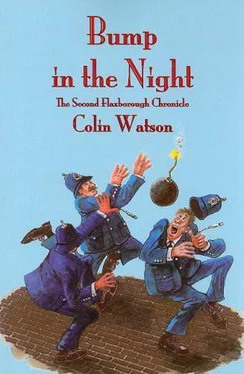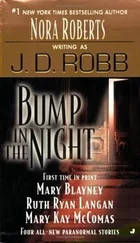“Just about everything he’s ever had a chance to get away with. You know perfectly well what he is. It beats me why you let the swine into the house. As for allowing Hilda...”
Larch’s long, sunken cheek twitched. “Yes?” he lisped.
“Well, damn it all. Hector...” Pointer glared at his hat, then suddenly picked it up and clapped it on the desk. The topmost of Larch’s neatly stacked papers was fanned from the pile and floated to the floor.
Larch bent slowly and retrieved it. “Hilda’s friends are her own affair, and when one of them happens to be a friend of mine as well so much the less need for you to worry. Or,” he added after a pause, “her mother.”
Pointer looked up at the ceiling. “Oh, for heaven’s sake!”
“All right: I know she doesn’t like him.”
“I don’t care a rap who she likes. I’m giving you my opinion, not hers. Biggadyke’s not the sort of specimen I should have thought a policeman would care to associate with.”
“You’d be surprised if I told you some of the people I have to keep on my social register. They’d be cut dead in the mayor’s parlour but they’re damned useful to me.”
“That’s different. I have to mix with some queer customers in my trade, but I don’t invite them home if I can help it. Always keep ’em the other side of the counter, son.”
Larch felt like telling his father-in-law that this, his advice-to-my-men manner, did not wash outside the committee room of the Comrades of the Trenches Club. But his shrug was a dismissal of the subject. He never carried an argument beyond the stage at which his ultimate winning of it became problematical.
In Jubilee Park, Sergeant Worple paced slowly and in isolation around the enclosure roped off by Mr Harding. He contemptuously ignored the stares of those whom the spectacle of his apparent quarantine had drawn, like inquisitive badgers, from the Old Men’s Shelter. He also affected not to hear the disrespectful remarks of two or three small boys who kept asking him the time.
During the previous half hour the sergeant had collected a lot of measurements, in the relevance of which he had no faith whatever, and also what few material clues—mostly twisted metal fragments—as he thought might testify to his zeal and perspicacity. These he had put in an envelope.
Worple was about to quit his compound when he was greeted by a man who, though grey-haired, stood apart from the solemn excursionists from the Old Men’s Shelter.
The policeman strolled over and ducked beneath the rope.
“Sheep dog trials?” the man asked pleasantly.
“Actually,” said Worple, “no, sir. Your guess is very wide. The talk is all of an explosion.”
“My!”
“Look over there, Mr Payne.” He pointed to the concrete apron from which the last vestiges of water were steaming off into the midday sunshine. “We have reason to believe that that was the work of a bomb.”
“Wasn’t there a sort of memorial there? I seem to remember one.”
“A drinking fountain, Mr Payne. An amenity. One pressed a button in the centre of the representation of a lion’s face—its nose, as it were—and a stream of water was released downward from a faucet. It worked on the principle of mains pressure.”
“Ingenious,” remarked Mr Payne. He drummed his cheek with two fingers and stared thoughtfully at the space vacated by the drinking fountain.
Cornelius Payne bore a striking resemblance to the late Arturo Toscanini—not that the fact was much remarked upon in Chalmsbury. He had a triangular, sensitive face; crisp hair that tended to bunch at the sides; dark but by no means mournful eyes, deep set and watchful; and a waxed moustache that emphasized the firm, slightly sceptical set of his mouth.
The two men turned and strolled slowly toward the park gates. It was very hot and to the scent of drying grass mowings the light breeze added the oily tang of tar, spreading in wrinkled waves beneath the roadside dust.
When they were a safe distance from the eyes of the old men, Worple brought out from his tunic pocket the envelope of clues. He invited Payne to look inside. “That’s about all I managed to find,” he explained. “Of course, a mine detector’s what you want on a job like that. You wear headphones, you know, and they give a sort of high-pitched squeal when the detector passes over metal.”
Payne peered politely at the collection of mangled bits and pieces.
“They all mean something, looked at properly,” urged the sergeant.
Payne gingerly extracted one of the objects and held it on his palm. “Try interpreting this,” he invited.
The sergeant regarded it with head inclined first one way then the other. Finally he said: “Part of the firing mechanism, I shouldn’t wonder, sir. Of the bomb, you know. That hinge, you see, would enable contact to be made when...”
“It’s a suspender,” said Payne. He dropped it back in the envelope.
Some minutes later when they were walking along East Street (it was regarded in Chalmsbury as no great reflection upon either party for a policeman and a civilian to be seen in companionship) Worple returned to the subject.
“I believe you’re right about that thing being a memorial. I remember now. It was subscribed—paid for, you know—by Mrs Courtney-Snell.”
Payne nodded. “Leather-chops. That’s right.”
Worple gave him a reproachful glance. “She’s a magistrate, sir.”
“Ah!”
“Yes, indeed. A Justice of the Peace. Now I wonder if anyone had a grudge against her. Or against her late husband, for that matter. He was a decent enough gentleman, though, as far as I recall.”
“Wasn’t he mixed up in a law-suit or something just before he died?”
“Not mixed up exactly,” the sergeant corrected. “He was the successful plaintiff. He sued that haulage contractor, Mr Biggadyke, for slander. That’s defamation of character by word of mouth, sir.”
“A somewhat impetuous man, Mr Biggadyke, by all accounts.”
“Very likely. But that was no excuse for him going round and telling everybody that story about the Colonel and Bessie Egan.”
“Ah, yes. And the spurs.”
Worple shook his head gloomily and turned his attention to the mussel boats that were slipping in slow procession beneath the Borough Bridge, bound for the stages another quarter of a mile up river. “Tide time,” he remarked, with the countryman’s instinct for allowing no merely human speculations to interfere with the conscientious marking off of nature’s periods.
“I suppose,” added Worple, “that you’ll be off for your dinner now. Think of me, won’t you: straight off nights and being kept out of bed by this bomb business.” The words were belied by his air of self-congratulation; obviously he found the bomb business a welcome diversion.
“Rotten luck,” said Payne, watching for a chance to cross the road.
“Of course, you know what the trouble is,” confided the sergeant closely. “It’s the chief inspector. He hasn’t the first idea when it comes to looking into something unusual. He’s not had the education, you know. Still, keep that to yourself.”
“I shall indeed. Naturally.” Payne raised his hand in farewell and stepped from the kerb.
He did not, however, go straight to lunch. Outside the Nelson and Emma he encountered Barrington Hoole.
Wordlessly, as if by treaty, both men stepped down into the cool stone passageway of the inn. They pushed past the arguing overflow of farmers and seed merchants from the great bow-windowed market bar and entered the comparatively deserted tap room.
Seated in a corner was Mr Kebble, diligently writing on the backs of envelopes a platitudinous confection that he hoped would pass muster as that week’s “Pew and Pulpit”, a feature normally contributed by a rota of local clergymen, the copy for which had been lost in the case-room.
Читать дальше












